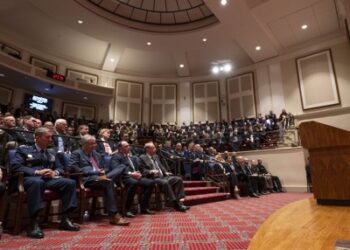On Thursday, December 14, 2023, Michael Duffey, the Trump administration’s nominee for undersecretary of defense for acquisition and sustainment, outlined his plans during his confirmation hearing. He emphasized his intention to scrutinize regulations and barriers that hinder new companies and private capital from entering the defense sector, which he believes stifles production.
Duffey stated that two critical metrics for measuring the success of the acquisition system are “speed” and “capacity.” He acknowledged that while the U.S. excels in performance and capability, there is a pressing need to accelerate speed and manage costs effectively. Duffey is currently serving as Deputy Chief of Staff to Defense Secretary Pete Hegseth, a position he has held since January 2023.
The topic of acquisition reform, especially the urgency to incorporate advanced technologies and new companies into the defense industrial base, has been a long-standing issue. Recently, Secretary Hegseth encouraged contracting officers to adopt rapid buying authorities for software programs, a decision which has received mixed reactions.
During the confirmation hearing, Duffey noted the importance of adaptability in response to technological advancements and changing threats. He acknowledged that significant improvements have been made in acquiring systems, but emphasized that further progress is needed.
However, the hearing became contentious when Democratic senators questioned Duffey and other defense nominees, including Keith Bass, Emil Michael, and Troy Meink, regarding security protocols related to the Signal group chat scandal. This incident involved several senior Trump administration officials, including Hegseth and Vice President JD Vance, sharing sensitive military operation details in an encrypted chat that included a journalist.
Sen. Mazie Hirono of Hawaii highlighted the importance of handling sensitive information correctly and inquired if any nominees had disclosed classified information on unclassified devices. All nominees answered in the negative, and Hirono pressed for an investigation into the Signal chat issue.
Sen. Elissa Slotkin of Michigan asked Duffey about his willingness to cooperate with a Department of Defense (DOD) inspector general investigation into the matter. Duffey responded that he was not part of the questioned chat and would maintain communication through approved channels.
In contrast, Republican Senator Eric Schmitt from Missouri dismissed the Democrats’ concerns as “faux outrage,” asserting that no war plans were discussed in the Signal chat. Meanwhile, Senator Mark Kelly from Arizona offered a more nuanced view, stressing that while the chat did not contain top-secret information, it did include critical operational details that could endanger military personnel if disclosed on insecure platforms.
The Senate Armed Services Committee’s hearing was notably the first since the revelation of the Signal chat scandal, which emerged earlier in the week, intensifying scrutiny on the nominees.













